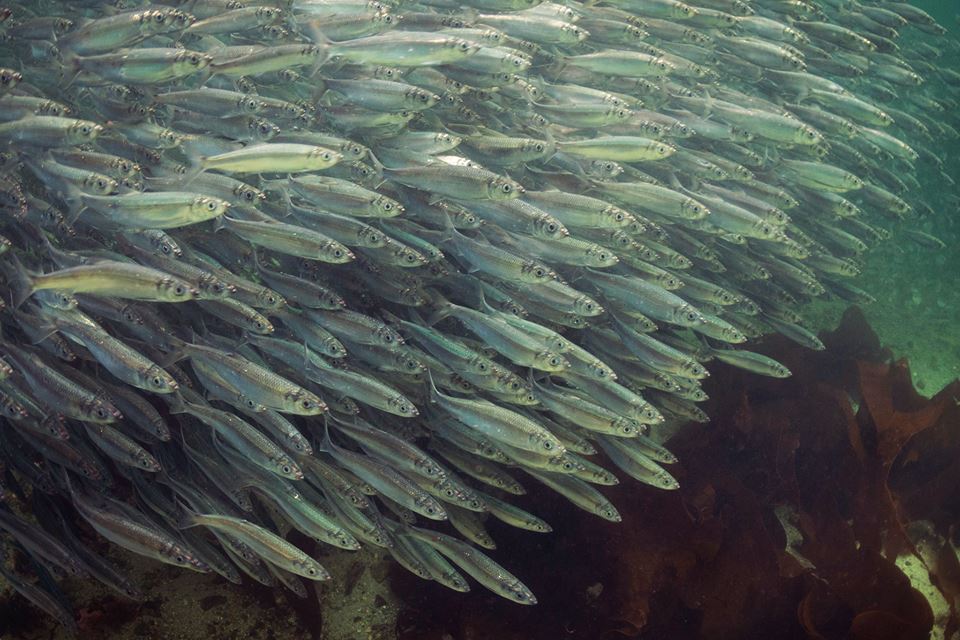Conservation groups say herring in the Strait of Georgia are in steep decline.
They’re calling for the immediate closure of the federal herring fishery after recently released data from the Department of Fisheries and Oceans show dwindling biomass.
The groups say that numbers have dropped from 129,500 metric tonnes in 2016, to 85,700 tonnes in 2019, and is predicted to fall to 54,242 tonnes in 2020.
That’s a 60 percent decline since 2016.
Conservancy Hornby Island president, Grant Scott, said this is the last of five herring runs along the coast and they’ve all seen the same decline.
“Two of those five are in early stages of recovery and are showing some recovery because they’ve been left alone for a few years, now, they (the fisheries) have been closed,” Scott said.
“So that’s the good part of the story is that we hope it’s going to get closed this year or have a greatly reduced fishery and we hope it can rebuild.”
Scott said “the sad part of the story” is that “it had to go through this serious decline before the modelling of DFO caught up to reality and said, ‘okay, now we’ve got to seriously look at this thing and start looking at serious reductions.’ They haven’t said they were going to close it; they said they were going to seriously reduce it.”
Scott said herring is a key species in the food web.
“All these creatures above them – killer whales indirectly because they eat salmon – but humpback whales, sea lions, seals, cod, halibut and thousands of seabirds of different species feed on herring and need it for their whole life cycle so it’s absolutely critical,” Scott said.
“And that’s been our whole point all along is for eco-system based management, this fish needs to be protected and just basically left alone.
Conservancy Hornby Island and the Association for Denman Island Marine Stewards – headquartered in the middle of the remaining herring spawning grounds in the Northern Gulf Islands – along with the Sea Shepherd Conservation Society and Pacific Wild, are calling on the federal government to create a Pacific Herring Recovery Program for the Strait of Georgia and immediately close the fishery.
Scott believes shutting down the herring fishery won’t have much an impact on the economy.
“The amazing part of it is, these fish are worth so little money into the Canadian economy,” he said. “There are people who get jobs out of it, but it’s relatively few and it’s a tiny part of the fish economy and the B.C. economy. So hopefully they’ll finally get it and shut this thing down.”
According to Victoria Postlethwaite, DFO’s regional herring officer, the 2019 quota was set based on a predicted return of 122,291 tonnes, but only 85,700 tonnes returned.
Fisheries ended up catching 25 percent of the population which the groups say exceeds the 20 percent harvest quota.
Last Friday, DFO released Commercial Fisheries Plans for the Food and Bait and Special Use fisheries, with recommended quotas of 500 short tons (453.6 metric tonnes) and 902 short tons (818.3 tonnes), respectively.
The plan for the roe fishery is expected in early December.
According to a DFO representative, the department is discussing total harvest levels between 1,600 and 10,850 tonnes for 2020 with stakeholders.
Stakeholders are defined by DFO as predominantly herring industry representatives and some First Nations.
Herring once spawned throughout the Strait of Georgia and Johnstone Strait, but only one area of spawn remains, located between Qualicum Beach and Comox.
The conservation groups are co-hosting a forum with the W̱SÁNEĆ Leadership Council on Nov. 7 in W̱SÁNEĆ territory.
They say that they “will discuss strategies for restoring the abundance and distribution of herring populations in the Salish Sea, develop ideas for what management will look like moving into the future, and return benefits to local communities.”
Pacific Wild executive director, Ian McAllister that if DFO is serious about protecting endangered Chinook salmon populations and Southern Resident Killer Whales, “the first step should be to protect what is left of their food supply.”
“Shutting the herring fishery down to let stocks recover should be the first course of action,” he said.
DFO responds
In a statement, the DFO said conservation is its first priority in its management of Strait of Georgia herring fisheries.
The DFO also said that every year, it conducts scientific surveys for each of the five major Pacific herring stock areas.
“These scientific surveys, along with biological sampling, inform a yearly peer-reviewed scientific stock assessment with up-to-date advice on the status of all five major stocks. DFO also works with Indigenous communities and harvesters in the Strait of Georgia to better understand herring distribution, spawn dynamics and traditional harvest areas.”
The DFO says that pacific herring forecasts are “highly uncertain because factors such as environmental conditions and predation can vary from year to year. The science advice includes a range of harvest options. DFO continues to examine fisheries management options for the 2019/20 fishing season in the Strait of Georgia and other harvest areas so that harvest rates adhere to a precautionary approach.”
The DFO says that for the 2018/2019 fishing season, a target harvest rate of 20 percent was provided for commercial fisheries in the Strait of Georgia.
For 2019, the forecasted range for the Strait of Georgia was 67,000 to 221,400 metric tonnes and the median was 122,921 tonnes.
“The most recent data from the scientific surveys indicate that in fact, spawning biomass in the Strait of Georgia was closer to the bottom half of the forecast range, resulting in a harvest rate of 25 percent in 2019,” the DFO said.
“DFO has tested and implemented a harvest strategy that has a high probability of conserving the stock over the long term, despite this uncertainty associated with the variability of the stock.”




